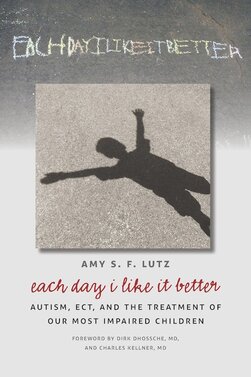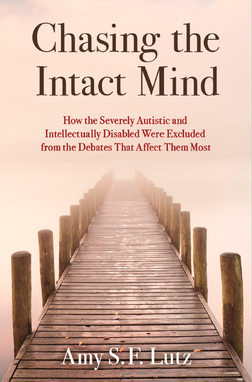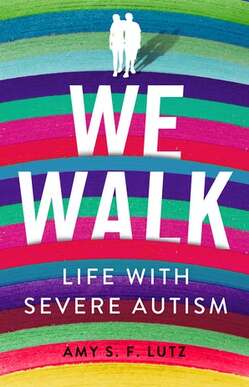Books
Chasing The Intact Mind
How The Severely Autistic and Intellectually Disabled Were Excluded from the Debates That Affect Them Most
|
The concept of the intact mind, first described in a 2006 memoir, refers to the idea that inside every autistic child is an intelligent, typical child waiting to be liberated by the right combination of supports and accommodations. Though the idea gives hope to parents devastated by a child's diagnosis, Amy Lutz argues that it has also contributed to widespread dismantling of services badly needed by severely disabled children and their families.
In Chasing the Intact Mind, Lutz traces the history of the intact mind concept, providing a historical analysis and describing how the concept has come to inform current debates at the heart of intellectual and developmental disability practice and policy in the United States, including battles over sheltered workshops, legal guardianship, and facilitated communication. She argues that marginalizing those with severe disability reproduces historic patterns of discrimination that yoked human worth to intelligence, and that it is only by making space for the impaired mind that we can resolve these ongoing clashes--as well as even larger questions of personhood, dependency, and care. |
"This is a fascinating book: It is forthright, it is honest, it is comprehensive, it is evidence-based. Importantly, this work tees up essential discussion of 'inclusion,' and how often it too relies on false hope, and distracts from our urgent need as a society to face the demands of guardianships and life-time supports we should be building for our autism community."
--Bryna Siegel, PhD, Founder & Executive Director, Autism Center of Northern California; Professor, Child & Adolescent Psychiatry, University of California (Ret.)
"Reading this brave, well-researched book I felt myself making a mental list of all the people to whom I'd recommend it. Lutz shows us the perilous seduction of the 'intact mind,' moving us through historic landmarks to the contested landscape in which we find ourselves today. With clarity of style and argument she shows how rhetoric transforms into policy, harming the very people those policies are meant to help. Her approach is one of deep empathy and understanding for those with severe autism, and their caregivers."
--Deborah R. Barnbaum, PhD, author of The Ethics of Autism: Among Them but Not of Them and Professor of Philosophy, Kent State University
"Amy Lutz bravely tackles the myth of the intact mind that has become so prevalent in modern autism dialogue. Lutz acknowledges that the intact mind mantra provides families critical 'high octane hope,' but also poignantly emphasizes the real-life consequences of blind adherence to dogma in terms of vastly reduced critical life opportunities for some of the most vulnerable individuals along the autism spectrum. A must-read for anyone truly committed to seeing all the faces of autism and optimizing care and long-term outcomes for everyone."
--Lee Elizabeth Wachtel, MD, Professor of Psychiatry, Johns Hopkins School of Medicine
--Bryna Siegel, PhD, Founder & Executive Director, Autism Center of Northern California; Professor, Child & Adolescent Psychiatry, University of California (Ret.)
"Reading this brave, well-researched book I felt myself making a mental list of all the people to whom I'd recommend it. Lutz shows us the perilous seduction of the 'intact mind,' moving us through historic landmarks to the contested landscape in which we find ourselves today. With clarity of style and argument she shows how rhetoric transforms into policy, harming the very people those policies are meant to help. Her approach is one of deep empathy and understanding for those with severe autism, and their caregivers."
--Deborah R. Barnbaum, PhD, author of The Ethics of Autism: Among Them but Not of Them and Professor of Philosophy, Kent State University
"Amy Lutz bravely tackles the myth of the intact mind that has become so prevalent in modern autism dialogue. Lutz acknowledges that the intact mind mantra provides families critical 'high octane hope,' but also poignantly emphasizes the real-life consequences of blind adherence to dogma in terms of vastly reduced critical life opportunities for some of the most vulnerable individuals along the autism spectrum. A must-read for anyone truly committed to seeing all the faces of autism and optimizing care and long-term outcomes for everyone."
--Lee Elizabeth Wachtel, MD, Professor of Psychiatry, Johns Hopkins School of Medicine
We Walk
Life with Severe Autism
|
In this collection of beautiful and raw essays, Amy S. F. Lutz writes openly about her experience―the positive and the negative―as the mother of a son with severe autism. Lutz's human emotion drives through each page and challenges commonly held ideas that define autism either as a disease or as neurodiversity. We Walk is inspired by questions raised by Lutz as a parent of a severely autistic, now twenty-one-year-old son: What is the place of the intellectually and developmentally disabled in society? What responsibilities do we, as citizens and human beings, owe one another? Who should decide for those who can't decide for themselves? What is the meaning of religion to someone with no abstract language? In exploring these questions, We Walk directly, but humanely, examines social issues such as inclusion, religion, therapeutics, and friendship through the lens of severe autism. In a world where the public perception of autism is largely shaped by the "quirky geniuses" featured on television shows like The Big Bang Theory and The Good Doctor, We Walk demands that we center our debates about this disorder on those who are most impacted by it.
|
"Drawing from a vast library of sources, Lutz deploys unruffled logic to address key issues in autism today—diagnostic and functioning labels, the mass trivialization of serious disorder, the desperate need for treatments, and the heartbreaking fears of aging autism parents. A triumph!"
—Jill Escher, President, National Council on Severe Autism
"If you want to understand autism - REAL autism - this is the book for you. Amy Lutz, mother of a son with severe, classic autism, tells it like it is; messy, scary, violent at times, but always grounded in love. As challenging and heartbreaking as this book can be to read, it's nothing compared to the daily struggles that people living on the autism spectrum and their caregivers face each day."
— Alison Singer, President, Autism Science Foundation
“...an honest and raw collection of essays that eloquently portrays the harsh reality of life parenting a child with severe autism. Amy Lutz faces head on the challenges of Jonah’s heartbreaking behaviors with unwavering strength and fortitude. Readers will be energized by her tenacity to ensure Jonah lives his life surrounded by love, dignity and respect. As the mother of twin sons with severe autism, her stories not only tugged at my heart, they instilled hope and promise for my sons, and all those facing this lifelong journey of autism.”
— Robyn K. Schneider, author of Silent Running: Our Family’s Journey to the Finish Line with Autism
“I read this book in one completely absorbed session, mesmerized by its pain and purpose. An important read for caregivers of all kinds.”
-- Arthur Kleinman, author of The Soul of Care
—Jill Escher, President, National Council on Severe Autism
"If you want to understand autism - REAL autism - this is the book for you. Amy Lutz, mother of a son with severe, classic autism, tells it like it is; messy, scary, violent at times, but always grounded in love. As challenging and heartbreaking as this book can be to read, it's nothing compared to the daily struggles that people living on the autism spectrum and their caregivers face each day."
— Alison Singer, President, Autism Science Foundation
“...an honest and raw collection of essays that eloquently portrays the harsh reality of life parenting a child with severe autism. Amy Lutz faces head on the challenges of Jonah’s heartbreaking behaviors with unwavering strength and fortitude. Readers will be energized by her tenacity to ensure Jonah lives his life surrounded by love, dignity and respect. As the mother of twin sons with severe autism, her stories not only tugged at my heart, they instilled hope and promise for my sons, and all those facing this lifelong journey of autism.”
— Robyn K. Schneider, author of Silent Running: Our Family’s Journey to the Finish Line with Autism
“I read this book in one completely absorbed session, mesmerized by its pain and purpose. An important read for caregivers of all kinds.”
-- Arthur Kleinman, author of The Soul of Care
Each Day I Like it Better
Autism, ECT, and the Treatment of Our Most Impaired Children

In the fall of 2009, Amy S.F. Lutz and her husband, Andy, struggled with one of the worst decisions any parent could possibly face: whether they could safely keep their autistic ten-year-old son, Jonah, at home any longer. Countless behavior strategies, multiple medication trials, and a ten-month hospitalization all failed to control his violent rages. Desperate to stop the attacks that left them emotionally crushed and physically battered, Amy and Andy decided to try the procedure that has been called “the most controversial treatment in medicine”: electroconvulsive therapy (ECT).
Each Day I Like It Better recounts Jonah’s ECT journey, including the countless failed interventions that drove his parents to consider ECT, his period under treatment, and his absolutely miraculous improvement. A survey of the most important research is incorporated into the narrative, and a foreword by child psychiatrist Dr. Dirk Dhossche and ECT researcher and practitioner Dr. Charles Kellner provides a basic understanding of ECT, explaining how and why it works, the side effects that patients may experience, and its use in the pediatric population in general and in autistic children in particular. Self-contained chapters feature other adolescents whose lives have been reclaimed through ECT.
Each Day I Like It Better recounts Jonah’s ECT journey, including the countless failed interventions that drove his parents to consider ECT, his period under treatment, and his absolutely miraculous improvement. A survey of the most important research is incorporated into the narrative, and a foreword by child psychiatrist Dr. Dirk Dhossche and ECT researcher and practitioner Dr. Charles Kellner provides a basic understanding of ECT, explaining how and why it works, the side effects that patients may experience, and its use in the pediatric population in general and in autistic children in particular. Self-contained chapters feature other adolescents whose lives have been reclaimed through ECT.
"Amy Lutz takes us inside the mysterious world of autism and provides a heart-wrenching chronicle of what it is like to love a child with almost overwhelming needs. She gives voice to the thousands of parents who must face the almost unimaginable challenges of getting help for a child with autism, and describes the unanticipated benefits of electroconvulsive therapy. I recommend this book not just for parents of children with autism, but for anyone facing the physical and emotional rollercoaster of caring for a loved one with a devastating illness."
--Eve Herold, Director, Office of Communications and Public Affairs for the American Psychiatric Association
"In addition to being one of the most moving accounts imaginable of the love and devotion that parents of these challenging but splendid children bring forth, the book is also one of the best informed: Amy Lutz is thoroughly familiar with the scientific literature, and applies it to her own, stricken world to great effect. I myself was at times close to tears in opening this book, and I think other readers may be as well."
--Edward Shorter, University of Toronto, co-author of Shock Therapy: A History of Electroconvulsive Treatment in Mental Illness
"Amy Lutz shines a bright spotlight on the needs of the most severely affected children with autism, a group that has long suffered in the dark. These kids, whose lives are challenged by self-injurious behaviors and aggressive outbursts that drastically limit their ability to interact in the world, should have access to all evidence-based interventions that science indicates can improve their lives, including ECT."
--Alison Singer, President, Autism Science Foundation


